Popular Italian Literature Books
28+ [Hand Picked] Popular Books On Italian Literature
Discover the list of some best books written on Italian Literature by popular award winning authors. These book on topic Italian Literature highly popular among the readers worldwide.

The Story of the Lost Child by Elena Ferrante , Ann Goldstein (Translator)
Here is the dazzling saga of two women, the brilliant, bookish Elena and the fiery, uncontainable Lila. Both are now adults; life’s great discoveries have been made, its vagaries and losses have been suffered. Through it all, the women’s friendship has remained the gravitational center of their lives. Both women once fought to escape the neighborhood in which they grew up— Here is the dazzling saga of two women, the brilliant, bookish Elena and the fiery, uncontainable Lila. Both are now adults; life’s great discoveries have been made, its vagaries and losses have been suffered. Through it all, the women’s friendship has remained the gravitational center of their lives. Both women once fought to escape the neighborhood in which they grew up—a prison of conformity, violence, and inviolable taboos. Elena married, moved to Florence, started a family, and published several well-received books. In this final book, she has returned to Naples. Lila, on the other hand, never succeeded in freeing herself from the city of her birth. She has become a successful entrepreneur, but her success draws her into closer proximity with the nepotism, chauvinism, and criminal violence that infect her neighborhood. Proximity to the world she has always rejected only brings her role as its unacknowledged leader into relief. For Lila is unstoppable, unmanageable, unforgettable! Against the backdrop of a Naples that is as seductive as it is perilous and a world undergoing epochal change, the story of a lifelong friendship is told with unmatched honesty and brilliance. The four volumes in this series constitute a long remarkable story that readers will return to again and again, and every return will bring with it new revelations.
I WANT TO READ THIS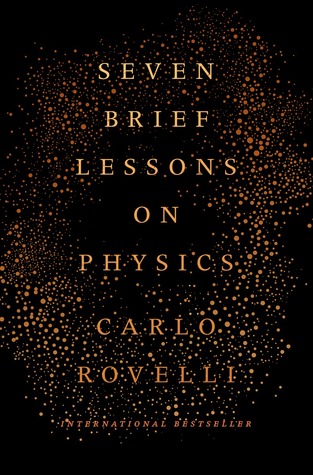
Seven Brief Lessons on Physics by Carlo Rovelli , Simon Carnell (Translator) , Erica Segre (Translator)
Everything you need to know about the beauty of modern physics in less than 100 pages. In seven brief lessons, Italian theoretical physicist Carlo Rovelli guides readers with admirable clarity through the most transformative physics breakthroughs of the twentieth and twenty-first centuries. This playful, entertaining and mind-bending introduction to modern physics, already Everything you need to know about the beauty of modern physics in less than 100 pages. In seven brief lessons, Italian theoretical physicist Carlo Rovelli guides readers with admirable clarity through the most transformative physics breakthroughs of the twentieth and twenty-first centuries. This playful, entertaining and mind-bending introduction to modern physics, already a major bestseller in Italy, explains general relativity, quantum mechanics, elementary particles, gravity, black holes, the complex architecture of the universe, and the role of humans in the strange world Rovelli describes. This is a book about the joy of discovery. It takes readers to the frontiers of our knowledge: to the most minute reaches of the fabric of space, back to the origins of the cosmos, and into the workings of our minds. “Here, on the edge of what we know, in contact with the ocean of the unknown, shines the mystery and the beauty of the world,” Rovelli writes. “And it’s breathtaking.”
I WANT TO READ THIS
Le otto montagne by Paolo Cognetti
Pietro è un ragazzino di città, solitario e un po' scontroso. La madre lavora in un consultorio di periferia, e farsi carico degli altri è il suo talento. Il padre è un chimico, un uomo ombroso e affascinante, che torna a casa ogni sera dal lavoro carico di rabbia. I genitori di Pietro sono uniti da una passione comune, fondativa: in montagna si sono conosciuti, innamorati Pietro è un ragazzino di città, solitario e un po' scontroso. La madre lavora in un consultorio di periferia, e farsi carico degli altri è il suo talento. Il padre è un chimico, un uomo ombroso e affascinante, che torna a casa ogni sera dal lavoro carico di rabbia. I genitori di Pietro sono uniti da una passione comune, fondativa: in montagna si sono conosciuti, innamorati, si sono addirittura sposati ai piedi delle Tre Cime di Lavaredo. La montagna li ha uniti da sempre, anche nella tragedia, e l'orizzonte lineare di Milano li riempie ora di rimpianto e nostalgia. Quando scoprono il paesino di Grana, ai piedi del Monte Rosa, sentono di aver trovato il posto giusto: Pietro trascorrerà tutte le estati in quel luogo «chiuso a monte da creste grigio ferro e a valle da una rupe che ne ostacola l'accesso» ma attraversato da un torrente che lo incanta dal primo momento. E lì, ad aspettarlo, c'è Bruno, capelli biondo canapa e collo bruciato dal sole: ha la sua stessa età ma invece di essere in vacanza si occupa del pascolo delle vacche. Iniziano così estati di esplorazioni e scoperte, tra le case abbandonate, il mulino e i sentieri più aspri. Sono anche gli anni in cui Pietro inizia a camminare con suo padre, «la cosa più simile a un'educazione che abbia ricevuto da lui». Perché la montagna è un sapere, un vero e proprio modo di respirare, e sarà il suo lascito più vero: «Eccola lì, la mia eredità: una parete di roccia, neve, un mucchio di sassi squadrati, un pino». Un'eredità che dopo tanti anni lo riavvicinerà a Bruno. Paolo Cognetti, uno degli scrittori più apprezzati dalla critica e amati dai lettori, entra nel catalogo Einaudi con un libro magnetico e adulto, che esplora i rapporti accidentati ma granitici, la possibilità di imparare e la ricerca del nostro posto nel mondo.
I WANT TO READ THIS
At the Wolf's Table by Rosella Postorino , Leah Janeczko (Translator)
The internationally bestselling novel based on the untold true story of the women conscripted to be Hitler's food tasters. "They called it the Wolfsschanze, the Wolf's Lair. 'Wolf' was his nickname. As hapless as Little Red Riding Hood, I had ended up in his belly. A legion of hunters was out looking for him, and to get him in their grips they would gladly slay me as well." The internationally bestselling novel based on the untold true story of the women conscripted to be Hitler's food tasters. "They called it the Wolfsschanze, the Wolf's Lair. 'Wolf' was his nickname. As hapless as Little Red Riding Hood, I had ended up in his belly. A legion of hunters was out looking for him, and to get him in their grips they would gladly slay me as well." Germany, 1943: Twenty-six-year-old Rosa Sauer's parents are gone, and her husband Gregor is far away, fighting on the front lines of WWII. Impoverished and alone, she makes the fateful decision to leave war-torn Berlin to live with her in-laws in the countryside, thinking she'll find refuge there. But one morning, the SS come to tell her she has been conscripted to be one of Hitler's tasters: three times a day, she and nine other women go to his secret headquarters, the Wolf's Lair, to eat his meals before he does. Forced to eat what might kill them, the tasters begin to divide into The Fanatics, those loyal to Hitler, and the women like Rosa who insist they aren't Nazis, even as they risk their lives every day for Hitler's. As secrets and resentments grow, this unlikely sisterhood reaches its own dramatic climax. What's more, one of Rosa's SS guards has become dangerously familiar, and the war is worsening outside. As the months pass, it becomes increasingly clear that Rosa and everyone she knows are on the wrong side of history.
I WANT TO READ THIS
L'Arminuta by Donatella Di Pietrantonio
Ci sono romanzi che toccano corde così profonde, originarie, che sembrano chiamarci per nome. È quello che accade con L'Arminuta fin dalla prima pagina, quando la protagonista, con una valigia in mano e una sacca di scarpe nell'altra, suona a una porta sconosciuta. Ad aprirle, sua sorella Adriana, gli occhi stropicciati, le trecce sfatte: non si sono mai viste prima. Inizi Ci sono romanzi che toccano corde così profonde, originarie, che sembrano chiamarci per nome. È quello che accade con L'Arminuta fin dalla prima pagina, quando la protagonista, con una valigia in mano e una sacca di scarpe nell'altra, suona a una porta sconosciuta. Ad aprirle, sua sorella Adriana, gli occhi stropicciati, le trecce sfatte: non si sono mai viste prima. Inizia così questa storia dirompente e ammaliatrice: con una ragazzina che da un giorno all'altro perde tutto – una casa confortevole, le amiche più care, l'affetto incondizionato dei genitori. O meglio, di quelli che credeva i suoi genitori. Per «l'Arminuta» (la ritornata), come la chiamano i compagni, comincia una nuova e diversissima vita. La casa è piccola, buia, ci sono fratelli dappertutto e poco cibo sul tavolo. Ma c'è Adriana, che condivide il letto con lei. E c'è Vincenzo, che la guarda come fosse già una donna. E in quello sguardo irrequieto, smaliziato, lei può forse perdersi per cominciare a ritrovarsi. L'accettazione di un doppio abbandono è possibile solo tornando alla fonte a se stessi. Donatella Di Pietrantonio conosce le parole per dirlo, e affronta il tema della maternità, della responsabilità e della cura, da una prospettiva originale e con una rara intensità espressiva. Le basta dare ascolto alla sua terra, a quell'Abruzzo poco conosciuto, ruvido e aspro, che improvvisamente si accende col riflesso del mare.
I WANT TO READ THIS
Fedeltà by Marco Missiroli
«Che parola sbagliata, amante. Che parola sbagliata, tradimento». Siamo sicuri che resistere a una tentazione significhi essere fedeli? E se quella rinuncia rappresentasse il tradimento della nostra indole più profonda? La fedeltà è un'àncora che ci permette di non essere travolti nella tempesta, ma è anche lo specchio in cui ci cerchiamo ogni giorno sperando di riconoscerc «Che parola sbagliata, amante. Che parola sbagliata, tradimento». Siamo sicuri che resistere a una tentazione significhi essere fedeli? E se quella rinuncia rappresentasse il tradimento della nostra indole più profonda? La fedeltà è un'àncora che ci permette di non essere travolti nella tempesta, ma è anche lo specchio in cui ci cerchiamo ogni giorno sperando di riconoscerci. Marco Missiroli lo racconta andando al cuore dei suoi personaggi: lui, lei, l'altra, e l'altro. Noi stessi. Preparatevi a leggere la vostra storia. «Il malinteso», così Carlo e Margherita chiamano il dubbio che ha incrinato la superficie del loro matrimonio. Carlo è stato visto nel bagno dell'università insieme a una studentessa: «si è sentita male, l'ho soccorsa», racconta al rettore, ai colleghi, alla moglie, e Sofia conferma la sua versione. Margherita e Carlo non sono una coppia in crisi, la loro intesa è tenace, la confidenza il gioco pericoloso tra le lenzuola. Le parole fra loro ardono ancora, così come i gesti. Si definirebbero felici. Ma quel presunto tradimento per lui si trasforma in un'ossessione, e diventa un alibi potente per le fantasie di sua moglie. La verità è che Sofia ha la giovinezza, la libertà, e forse anche il talento che Carlo insegue per sé. Lui vorrebbe scrivere, non ci è mai riuscito, e il posto da professore l'ha ottenuto grazie all'influenza del padre. La porta dell'ambizione, invece, Margherita l'ha chiusa scambiando la carriera di architetto con la stabilità di un'agenzia immobiliare. Per lei tutto si complica una mattina qualunque, durante una seduta di fisioterapia. Andrea è la leggerezza che la distoglie dai suoi progetti familiari e che innesca l'interrogativo di questa storia: se siamo fedeli a noi stessi quanto siamo infedeli agli altri? La risposta si insinua nella forza quieta dei legami, tenuti insieme in queste pagine da Anna, la madre di Margherita, il faro illuminante del romanzo, uno di quei personaggi capaci di trasmettere il senso dell'esistenza. In una Milano vivissima, tra le vecchie vie raccontate da Buzzati e i nuovi grattacieli che tagliano l'orizzonte, e una Rimini in cui sopravvive il sentimento poetico dei nostri tempi, il racconto si fa talmente intimo da non lasciare scampo.
I WANT TO READ THIS
The Italian Wife by Kate Furnivall
Italy, 1932 -- Mussolini's Italy is growing from strength to strength, but at what cost? One bright autumn morning, architect Isabella Berotti sits at a café in the vibrant centre of Bellina, when a woman she's never met asks her to watch her ten-year-old daughter, just for a moment. Reluctantly, Isabella agrees -- and then watches in horror as the woman climbs to the top o Italy, 1932 -- Mussolini's Italy is growing from strength to strength, but at what cost? One bright autumn morning, architect Isabella Berotti sits at a café in the vibrant centre of Bellina, when a woman she's never met asks her to watch her ten-year-old daughter, just for a moment. Reluctantly, Isabella agrees -- and then watches in horror as the woman climbs to the top of the town's clock tower and steps over the edge. This tragic encounter draws vivid memories to the surface, forcing Isabella to probe deeper into the secrets of her own past as she tries to protect the young girl from the authorities. Together with charismatic photographer Roberto Falco, Isabella is about to discover that secrets run deeper, and are more dangerous, than either of them could have possibly imagined . . . From the glittering marble piazzas, to the picturesque hillside villages and winding streets of Rome, Kate Furnivall's epic new novel will take you on an breathtaking journey of intrigue, romance and betrayal.
I WANT TO READ THIS
The Temptation of Forgiveness by Donna Leon
In the twenty-seventh novel in Donna Leon's bestselling mystery series, a suspicious accident leads Commissario Guido Brunetti to uncover a longstanding scam with disturbing unintended consequences The memorable characters and Venetian drama that have long captivated Donna Leon’s many readers are on full display in The Temptation of Forgiveness. Surprised, if not dismayed, In the twenty-seventh novel in Donna Leon's bestselling mystery series, a suspicious accident leads Commissario Guido Brunetti to uncover a longstanding scam with disturbing unintended consequences The memorable characters and Venetian drama that have long captivated Donna Leon’s many readers are on full display in The Temptation of Forgiveness. Surprised, if not dismayed, to discover from his superior, Vice-Questore Patta, that leaks are emanating from the Questura, Commissario Guido Brunetti is surprised more consequentially by the appearance of a friend of his wife’s, fearful that her son is using drugs and hopeful Brunetti can somehow intervene. When Tullio Gasparini, the woman’s husband, is found unconscious and with a serious brain injury at the foot of a bridge in Venice after midnight, Brunetti is drawn to pursue a possible connection to the boy’s behavior. But the truth, as Brunetti has experienced so often, is not straightforward. As the twenty-seventh novel unfolds in Donna Leon’s exquisite chronicle of Venetian life in all its blissful and sordid aspects, Brunetti pursues several false and contradictory leads while growing ever more impressed by the intuition of his fellow Commissario, Claudia Griffoni, and by the endless resourcefulness and craftiness of Signorina Elettra, Patta’s secretary and gate-keeper. Exasperated by the petty bureaucracy that constantly bedevils him and threatens to expose Signorina Elettra, Brunetti is steadied by the embrace of his own family and by his passion for the classics. This predilection leads him to read Sophocles’ Antigone, and, in its light, consider the terrible consequences to which the actions of a tender heart can lead.
I WANT TO READ THIS
My Italian Bulldozer by Alexander McCall Smith
When writer Paul Stewart heads to the idyllic Italian town of Montalcino to finish his already late book, it seems like the perfect escape from stressful city life. Upon landing, however, things quickly take a turn for the worse when he discovers his hired car is nowhere to be found. With no record of any reservation and no other cars available it looks like Paul is stuck When writer Paul Stewart heads to the idyllic Italian town of Montalcino to finish his already late book, it seems like the perfect escape from stressful city life. Upon landing, however, things quickly take a turn for the worse when he discovers his hired car is nowhere to be found. With no record of any reservation and no other cars available it looks like Paul is stuck at the airport. That is, until an enterprising stranger offers him an unexpected alternative. While there may be no cars available there is something else on offer: a bulldozer.With little choice in the matter, Paul accepts and so begins a series of laugh out loud adventures through the Italian countryside, following in the wake of Paul and his Italian Bulldozer. A story of unexpected circumstance and lesson in making the best of what you have, My Italian Bulldozer is a warm holiday read guaranteed to put a smile on your face.
I WANT TO READ THIS
La giostra degli scambi by Andrea Camilleri
La giornata comincia storta per Montalbano: intervenuto per sedare una rissa sulla spiaggia di Marinella ha colpito l’uomo sbagliato e poi, scambiato per uno degli aggressori, viene fermato dai carabinieri. Infine scopre che Adelina ha scambiato un galantuomo per ladro e gli ha sbattuto in testa una padella… Approdato finalmente in ufficio il commissario viene informato di La giornata comincia storta per Montalbano: intervenuto per sedare una rissa sulla spiaggia di Marinella ha colpito l’uomo sbagliato e poi, scambiato per uno degli aggressori, viene fermato dai carabinieri. Infine scopre che Adelina ha scambiato un galantuomo per ladro e gli ha sbattuto in testa una padella… Approdato finalmente in ufficio il commissario viene informato di un anomalo sequestro: una ragazza è stata aggredita in una strada solitaria, narcotizzata e rilasciata dopo qualche ora illesa. La cosa si ripete dopo qualche giorno; questa volta la vittima del sequestro lampo è la nipote di Enzo, il proprietario della trattoria rifugio di Montalbano. L’unico filo che lega i due sequestri è l’età delle due donne, 30 anni, e il lavoro in banca. A questa indagine si affianca quella per l’incendio doloso di un negozio di elettrodomestici il cui proprietario, Marcello Di Carlo, pare essersi volatilizzato: fuga d’amore dopo un soggiorno alle Canarie, sparizione studiata per sottrarsi ai debitori o vendetta della mafia per pizzo non pagato? La vicenda all’inizio sembra banale, ma un terzo sequestro lampo - ancora una volta una ragazza che lavora in un istituto di credito - e il ritrovamento di un cadavere apre nuovi scenari. Di chi è il corpo? e dove è finita la fidanzata segreta di Di Carlo? Sebbene il commissario si senta invecchiare, forte delle sue intuizioni e del suo agire fuori dagli schemi vede giusto e superando la soluzione a portata di mano - mai fidarsi delle apparenze - giunge alla verità. Grazie alla sua logica stringente, ma soprattutto alla sua capacità, quella sì che si avvale del peso degli anni, di comprendere moventi e sentimenti.
I WANT TO READ THIS
The Waters of Eternal Youth by Donna Leon
In Donna Leon’s Commissario Guido Brunetti series, the Venetian inspector has been called on to investigate many things, from shocking to petty crimes. But in The Waters of Eternal Youth, the 25th novel in this celebrated series, Brunetti finds himself drawn into a case that may not be a case at all. Fifteen years ago, a teenage girl fell into a canal late at night. Unable In Donna Leon’s Commissario Guido Brunetti series, the Venetian inspector has been called on to investigate many things, from shocking to petty crimes. But in The Waters of Eternal Youth, the 25th novel in this celebrated series, Brunetti finds himself drawn into a case that may not be a case at all. Fifteen years ago, a teenage girl fell into a canal late at night. Unable to swim, she went under and started to drown, only surviving thanks to a nearby man, an alcoholic, who heard her splashes and pulled her out, though not before she suffered irreparable brain damage that left her in a state of permanent childhood, unable to learn or mature. The drunk man claimed he saw her thrown into the canal by another man, but the following day he couldn’t remember a thing. Now, at a fundraising dinner for a Venetian charity, a wealthy and aristocratic patroness—the girl’s grandmother—asks Brunetti if he will investigate. Brunetti’s not sure what to do. If a crime was committed, it would surely have passed the statute of limitations. But out of a mixture of curiosity, pity, and a willingness to fulfill the wishes of a guilt-wracked older woman, who happens to be his mother-in-law’s best friend, he agrees. Brunetti soon finds himself unable to let the case rest, if indeed there is a case. Awash in the rhythms and concerns of contemporary Venetian life, from historical preservation, to housing, to new waves of African migrants, and the haunting story of a woman trapped in a damaged perpetual childhood, The Waters of Eternal Youth is another wonderful addition to this series.
I WANT TO READ THIS
By Its Cover by Donna Leon
Few detective writers create so vivid, inclusive and convincing a narrative as Donna Leon . . . . One of the most exquisite and subtle detective series ever.” —The Washington Post Donna Leon’s critically acclaimed, internationally bestselling Commissario Guido Brunetti series has attracted readers the world over with the beauty of its setting, the humanity of its characters Few detective writers create so vivid, inclusive and convincing a narrative as Donna Leon . . . . One of the most exquisite and subtle detective series ever.” —The Washington Post Donna Leon’s critically acclaimed, internationally bestselling Commissario Guido Brunetti series has attracted readers the world over with the beauty of its setting, the humanity of its characters, and its fearlessness in exploring politics, morality, and contemporary Italian culture. In the pages of Leon’s novels, the beloved conversations of the Brunetti family have drawn on topics of art and literature, but books are at the heart of this novel in a way they never have been before. One afternoon, Commissario Guido Brunetti gets a frantic call from the director of a prestigious Venetian library. Someone has stolen pages out of several rare books. After a round of questioning, the case seems clear: the culprit must be the man who requested the volumes, an American professor from a Kansas university. The only problem—the man fled the library earlier that day, and after checking his credentials, the American professor doesn’t exist. As the investigation proceeds, the suspects multiply. And when a seemingly harmless theologian, who had spent three years at the library reading the Fathers of the Church, turns up brutally murdered, Brunetti must question his expectations about what makes a man innocent, or guilty.
I WANT TO READ THIS
In Other Words by Jhumpa Lahiri , Ann Goldstein (Translator)
From the Pulitzer Prize winner, a surprising, powerful, and eloquent nonfiction debut In Other Words is at heart a love story—of a long and sometimes difficult courtship, and a passion that verges on obsession: that of a writer for another language. For Jhumpa Lahiri, that love was for Italian, which first captivated and capsized her during a trip to Florence after college. From the Pulitzer Prize winner, a surprising, powerful, and eloquent nonfiction debut In Other Words is at heart a love story—of a long and sometimes difficult courtship, and a passion that verges on obsession: that of a writer for another language. For Jhumpa Lahiri, that love was for Italian, which first captivated and capsized her during a trip to Florence after college. And although Lahiri studied Italian for many years afterward, true mastery had always eluded her. So in 2012, seeking full immersion, she decided to move to Rome with her family, for “a trial by fire, a sort of baptism” into a new language and world. In Rome, Lahiri began to read, and to write—initially in her journal—solely in Italian. In Other Words, an autobiographical work written in Italian, investigates the process of learning to express oneself in another language, and describes the journey of a writer seeking a new voice. Presented in a dual-language format, it is a book about exile, linguistic and otherwise, written with an intensity and clarity not seen since Nabokov. A startling act of self-reflection and a provocative exploration of belonging and reinvention.
I WANT TO READ THIS
La ragazza nella nebbia by Donato Carrisi
«La giustizia non fa ascolti. La giustizia non interessa a nessuno. La gente vuole un mostro… E io le do quello che vuole.» La notte in cui tutto cambia per sempre è una notte di ghiaccio e nebbia ad Avechot, un paese rintanato in una valle profonda fra le ombre delle Alpi. Forse è stata proprio colpa della nebbia se l’auto dell’agente speciale Vogel è finita in un fosso. U «La giustizia non fa ascolti. La giustizia non interessa a nessuno. La gente vuole un mostro… E io le do quello che vuole.» La notte in cui tutto cambia per sempre è una notte di ghiaccio e nebbia ad Avechot, un paese rintanato in una valle profonda fra le ombre delle Alpi. Forse è stata proprio colpa della nebbia se l’auto dell’agente speciale Vogel è finita in un fosso. Un banale incidente. Vogel è illeso, ma sotto shock. Non ricorda perché è lì e come ci è arrivato. Eppure una cosa è certa: l’agente speciale Vogel dovrebbe trovarsi da tutt’altra parte, lontano da Avechot. Infatti, sono ormai passati due mesi da quando una ragazzina del paese è scomparsa nella nebbia. Due mesi da quando Vogel si è occupato di quello che, da semplice caso di allontanamento volontario, si è trasformato prima in un caso di rapimento e, da lì, in un colossale caso mediatico. Perché è questa la specialità di Vogel. Non gli interessa nulla del dna, non sa che farsene dei rilevamenti della scientifica, però in una cosa è insuperabile: manovrare i media. Attirare le telecamere, conquistare le prime pagine. Ottenere sempre più fondi per l’indagine grazie all’attenzione e alle pressioni del «pubblico a casa». Santificare la vittima e, alla fine, scovare il mostro e sbatterlo in galera. Questo è il suo gioco, e questa è la sua «firma». Perché ci vuole uno come lui, privo di scrupoli, sicuro dei propri metodi, per far sì che un crimine riceva ciò che realmente gli spetta: non tanto una soluzione, quanto un’audience. Sono passati due mesi da tutto questo, e l’agente speciale Vogel dovrebbe essere lontano, ormai, da quelle montagne inospitali. Ma allora, cosa ci fa ancora lì? Perché quell’incidente? Ma soprattutto, visto che è illeso, a chi appartiene il sangue che ha sui vestiti?
I WANT TO READ THIS
Lacci by Domenico Starnone
Che cosa lasciamo, quando lasciamo qualcuno? Una casa, una famiglia, il passato, un'idea di futuro, la nostra peggiore fotografia impressa a fuoco negli occhi di chi abbiamo amato. Passiamo la vita a spaccare vasi e incollare cocci illudendoci di essere nuovi di zecca. E cerchiamo di non guardare troppo indietro, perché il tempo dei bilanci è un tempo vano, ridicolo e stru Che cosa lasciamo, quando lasciamo qualcuno? Una casa, una famiglia, il passato, un'idea di futuro, la nostra peggiore fotografia impressa a fuoco negli occhi di chi abbiamo amato. Passiamo la vita a spaccare vasi e incollare cocci illudendoci di essere nuovi di zecca. E cerchiamo di non guardare troppo indietro, perché il tempo dei bilanci è un tempo vano, ridicolo e struggente. Domenico Starnone ha scritto un libro intensissimo e vero. Il racconto a tre voci delle forze sotterranee che tengono in vita i matrimoni anche dopo l'amore. «Se tu te ne sei scordato, egregio signore, te lo ricordo io: sono tua moglie». Si apre cosí la lettera che Vanda scrive al marito che se n'è andato di casa, lasciandola in preda a una tempesta di rabbia impotente e domande che non trovano risposta. Si sono sposati giovani all'inizio degli anni Sessanta, per desiderio di indipendenza, ma poi attorno a loro il mondo è cambiato, e ritrovarsi a trent'anni con una famiglia a carico è diventato un segno di arretratezza piú che di autonomia. Perciò adesso lui se ne sta a Roma, innamorato della grazia lieve di una sconosciuta con cui i giorni sono sempre gioiosi, e lei a Napoli con i figli, a misurare l'estensione del silenzio e il crescere dell'estraneità. Che cosa siamo disposti a sacrificare, pur di non sentirci in trappola? E che cosa perdiamo, quando scegliamo di tornare sui nostri passi? Perché niente è piú radicale dell'abbandono, ma niente è piú tenace di quei lacci invisibili che legano le persone le une alle altre. E a volte basta un gesto minimo per far riaffiorare quello che abbiamo provato a mettere da parte. Domenico Starnone ci regala una storia emozionante e fortissima, il racconto magistrale di una fuga, di un ritorno, di tutti i fallimenti, quelli che ci sembrano insuperabili e quelli che ci fanno compagnia per una vita intera.
I WANT TO READ THIS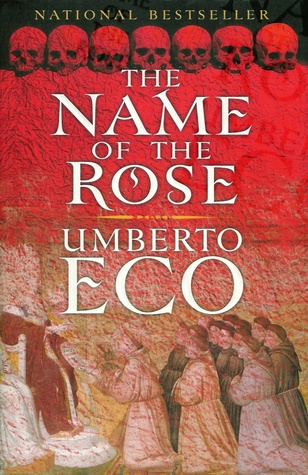
The Name of the Rose by Umberto Eco , William Weaver (Translator) , Seán Barrett (Reading)
The year is 1327. Benedictines in a wealthy Italian abbey are suspected of heresy, and Brother William of Baskerville arrives to investigate. When his delicate mission is suddenly overshadowed by seven bizarre deaths, Brother William turns detective. His tools are the logic of Aristotle, the theology of Aquinas, the empirical insights of Roger Bacon—all sharpened to a glis The year is 1327. Benedictines in a wealthy Italian abbey are suspected of heresy, and Brother William of Baskerville arrives to investigate. When his delicate mission is suddenly overshadowed by seven bizarre deaths, Brother William turns detective. His tools are the logic of Aristotle, the theology of Aquinas, the empirical insights of Roger Bacon—all sharpened to a glistening edge by wry humor and a ferocious curiosity. He collects evidence, deciphers secret symbols and coded manuscripts, and digs into the eerie labyrinth of the abbey, where “the most interesting things happen at night.”
I WANT TO READ THIS
If on a Winter's Night a Traveler by Italo Calvino , William Weaver (Translator)
If on a Winter's Night a Traveler is a marvel of ingenuity, an experimental text that looks longingly back to the great age of narration—"when time no longer seemed stopped and did not yet seem to have exploded." Italo Calvino's novel is in one sense a comedy in which the two protagonists, the Reader and the Other Reader, ultimately end up married, having almost finished I If on a Winter's Night a Traveler is a marvel of ingenuity, an experimental text that looks longingly back to the great age of narration—"when time no longer seemed stopped and did not yet seem to have exploded." Italo Calvino's novel is in one sense a comedy in which the two protagonists, the Reader and the Other Reader, ultimately end up married, having almost finished If on a Winter's Night a Traveler. In another, it is a tragedy, a reflection on the difficulties of writing and the solitary nature of reading. The Reader buys a fashionable new book, which opens with an exhortation: "Relax. Concentrate. Dispel every other thought. Let the world around you fade." Alas, after 30 or so pages, he discovers that his copy is corrupted, and consists of nothing but the first section, over and over. Returning to the bookshop, he discovers the volume, which he thought was by Calvino, is actually by the Polish writer Bazakbal. Given the choice between the two, he goes for the Pole, as does the Other Reader, Ludmilla. But this copy turns out to be by yet another writer, as does the next, and the next. The real Calvino intersperses 10 different pastiches—stories of menace, spies, mystery, premonition—with explorations of how and why we choose to read, make meanings, and get our bearings or fail to. Meanwhile the Reader and Ludmilla try to reach, and read, each other. If on a Winter's Night is dazzling, vertiginous, and deeply romantic. "What makes lovemaking and reading resemble each other most is that within both of them times and spaces open, different from measurable time and space."
I WANT TO READ THIS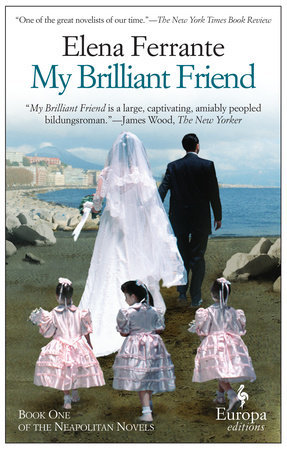
My Brilliant Friend by Elena Ferrante , Ann Goldstein (Translator)
A modern masterpiece from one of Italy's most acclaimed authors, My Brilliant Friend is a rich, intense and generous hearted story about two friends, Elena and Lila. Ferrante's inimitable style lends itself perfectly to a meticulous portrait of these two women that is also the story of a nation and a touching meditation on the nature of friendship. Through the lives of the A modern masterpiece from one of Italy's most acclaimed authors, My Brilliant Friend is a rich, intense and generous hearted story about two friends, Elena and Lila. Ferrante's inimitable style lends itself perfectly to a meticulous portrait of these two women that is also the story of a nation and a touching meditation on the nature of friendship. Through the lives of these two women, Ferrante tells the story of a neighbourhood, a city and a country as it is transformed in ways that, in turn, also transform the relationship between her two protagonists.
I WANT TO READ THIS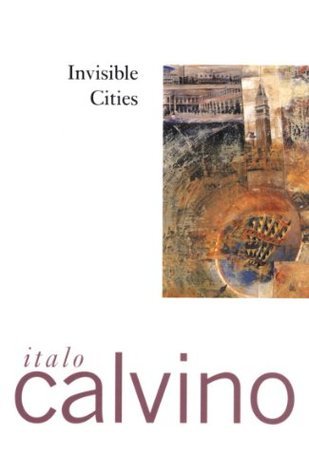
Invisible Cities by Italo Calvino , William Weaver (Translator)
"Kublai Khan does not necessarily believe everything Marco Polo says when he describes the cities visited on his expeditions, but the emperor of the Tartars does continue listening to the young Venetian with greater attention and curiosity than he shows any other messenger or explorer of his." So begins Italo Calvino's compilation of fragmentary urban images. As Marco tell "Kublai Khan does not necessarily believe everything Marco Polo says when he describes the cities visited on his expeditions, but the emperor of the Tartars does continue listening to the young Venetian with greater attention and curiosity than he shows any other messenger or explorer of his." So begins Italo Calvino's compilation of fragmentary urban images. As Marco tells the khan about Armilla, which "has nothing that makes it seem a city, except the water pipes that rise vertically where the houses should be and spread out horizontally where the floors should be," the spider-web city of Octavia, and other marvelous burgs, it may be that he is creating them all out of his imagination, or perhaps he is recreating fine details of his native Venice over and over again, or perhaps he is simply recounting some of the myriad possible forms a city might take.
I WANT TO READ THIS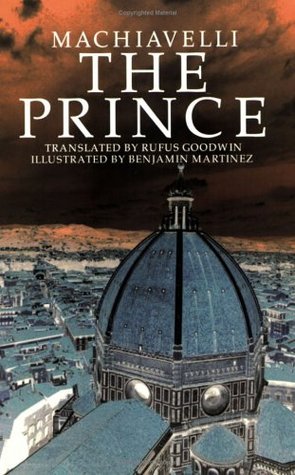
The Prince by Niccolò Machiavelli , Rufus Goodwin (Translator) , Benjamin Martinez (Illustrator)
Machiavelli needs to be looked at as he really was. Hence: Can Machiavelli, who makes the following observations, be Machiavellian as we understand the disparaging term? 1. So it is that to know the nature of a people, one need be a Prince; to know the nature of a Prince, one need to be of the people. 2. If a Prince is not given to vices that make him hated, it is unsusal Machiavelli needs to be looked at as he really was. Hence: Can Machiavelli, who makes the following observations, be Machiavellian as we understand the disparaging term? 1. So it is that to know the nature of a people, one need be a Prince; to know the nature of a Prince, one need to be of the people. 2. If a Prince is not given to vices that make him hated, it is unsusal for his subjects to show their affection for him. 3. Opportunity made Moses, Cyrus, Romulus, Theseus, and others; their virtue domi-nated the opportunity, making their homelands noble and happy. Armed prophets win; the disarmed lose. 4. Without faith and religion, man achieves power but not glory. 5. Prominent citizens want to command and oppress; the populace only wants to be free of oppression. 6. A Prince needs a friendly populace; otherwise in diversity there is no hope. 7. A Prince, who rules as a man of valor, avoids disasters, 8. Nations based on mercenary forces will never be solid or secure. 9. Mercenaries are dangerous because of their cowardice 10. There are two ways to fight: one with laws, the other with force. The first is rightly man’s way; the second, the way of beasts.
I WANT TO READ THIS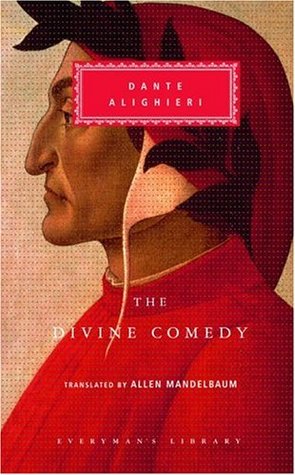
The Divine Comedy by Dante Alighieri , Allen Mandelbaum (Translator) , Eugenio Montale (Introduction)
The Divine Comedy describes Dante's descent into Hell with Virgil as a guide; his ascent of Mount Purgatory and encounter with his dead love, Beatrice; and finally, his arrival in Heaven. Examining questions of faith, desire and enlightenment, the poem is a brilliantly nuanced and moving allegory of human redemption. Dante Alighieri was born in Florence in 1265 and belonge The Divine Comedy describes Dante's descent into Hell with Virgil as a guide; his ascent of Mount Purgatory and encounter with his dead love, Beatrice; and finally, his arrival in Heaven. Examining questions of faith, desire and enlightenment, the poem is a brilliantly nuanced and moving allegory of human redemption. Dante Alighieri was born in Florence in 1265 and belonged to a noble but impoverished family. His life was divided by political duties and poetry, the most of famous of which was inspired by his meeting with Bice Portinari, whom he called Beatrice,including La Vita Nuova and The Divine Comedy. He died in Ravenna in 1321.
I WANT TO READ THIS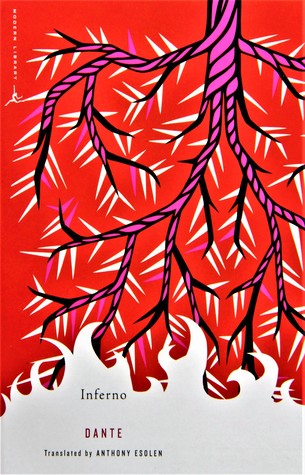
Inferno by Dante Alighieri , Anthony M. Esolen (Translator )
Guided by the poet Virgil, Dante plunges to the very depths of Hell and embarks on his arduous journey towards God. Together they descend through the twenty-four circles of the underworld and encounter the tormented souls of the damned - from heretics and pagans to gluttons, criminals and seducers - who tell of their sad fates and predict events still to come in Dante's li Guided by the poet Virgil, Dante plunges to the very depths of Hell and embarks on his arduous journey towards God. Together they descend through the twenty-four circles of the underworld and encounter the tormented souls of the damned - from heretics and pagans to gluttons, criminals and seducers - who tell of their sad fates and predict events still to come in Dante's life. In this first part of his Divine Comedy, Dante fused satire and humour with intellect and soaring passion to create an immortal Christian allegory of mankind's search for self-knowledge and spiritual enlightenment.
I WANT TO READ THIS
The Leopard by Giuseppe Tomasi di Lampedusa , Archibald Colquhoun (Translator)
The Leopard is a story of a decadent and dying aristocracy threatened by the forces of revolution and democracy. Set against the political upheavals of Italy in the 1860s, it focuses on Don Fabrizio, a Sicilian prince of immense sensual appetites, wealth, and great personal magnetism. Around this powerful figure swirls a glittering array of characters: a Bourbon king, libe The Leopard is a story of a decadent and dying aristocracy threatened by the forces of revolution and democracy. Set against the political upheavals of Italy in the 1860s, it focuses on Don Fabrizio, a Sicilian prince of immense sensual appetites, wealth, and great personal magnetism. Around this powerful figure swirls a glittering array of characters: a Bourbon king, liberals and pseudo liberals, peasants and millionaires.
I WANT TO READ THIS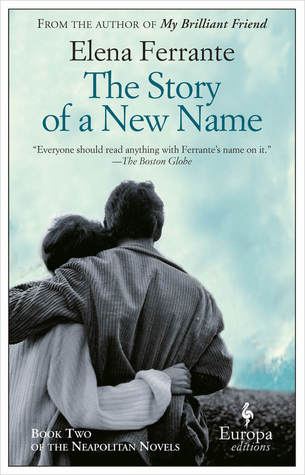
The Story of a New Name by Elena Ferrante , Ann Goldstein (Translator)
In 2012, Elena Ferrante's My Brilliant Friend introduced readers to the unforgettable Elena and Lila, whose lifelong friendship provides the backbone for the Neapolitan Novels. The Story of a New Name is the second book in this series. With these books, which the New Yorker's James Wood described as "large, captivating, amiably peopled ... a beautiful and delicate tale of In 2012, Elena Ferrante's My Brilliant Friend introduced readers to the unforgettable Elena and Lila, whose lifelong friendship provides the backbone for the Neapolitan Novels. The Story of a New Name is the second book in this series. With these books, which the New Yorker's James Wood described as "large, captivating, amiably peopled ... a beautiful and delicate tale of confluence and reversal," Ferrante proves herself to be one of Italy's most accomplished storytellers. She writes vividly about a specific neighborhood of Naples from the late-1950s through to the current day and about two remarkable young women who are very much the products of that place and time. Yet in doing so she has created a world in which readers will recognize themselves and has drawn a marvelously nuanced portrait of friendship. In The Story of a New Name, Lila has recently married and made her entrée into the family business; Elena, meanwhile, continues her studies and her exploration of the world beyond the neighborhood that she so often finds stifling. Love, jealousy, family, freedom, commitment, and above all friendship: these are signs under which both women live out this phase in their stories. Marriage appears to have imprisoned Lila, and the pressure to excel is at times too much for Elena. Yet the two young women share a complex and evolving bond that is central to their emotional lives and is a source of strength in the face of life's challenges. In these Neapolitan Novels, Elena Ferrante, the acclaimed author of The Days of Abandonment, gives readers a poignant and universal story about friendship and belonging.
I WANT TO READ THIS
The Decameron by Giovanni Boccaccio , G.H. McWilliam (Editor, Translator, Introduction) , L.A.J. Burgersdijk (Editor)
The Decameron (c.1351) is an entertaining series of one hundred stories written in the wake of the Black Death. The stories are told in a country villa outside the city of Florence by ten young noble men and women who are seeking to escape the ravages of the plague. Boccaccio's skill as a dramatist is masterfully displayed in these vivid portraits of people from all statio The Decameron (c.1351) is an entertaining series of one hundred stories written in the wake of the Black Death. The stories are told in a country villa outside the city of Florence by ten young noble men and women who are seeking to escape the ravages of the plague. Boccaccio's skill as a dramatist is masterfully displayed in these vivid portraits of people from all stations in life, with plots that revel in a bewildering variety of human reactions. Translated with an Introduction and Notes by G. H. McWilliam
I WANT TO READ THIS
Foucault's Pendulum by Umberto Eco , William Weaver (Translator)
Foucault's Pendulum is divided into ten segments represented by the ten Sefiroth. The novel is full of esoteric references to the Kabbalah. The title of the book refers to an actual pendulum designed by the French physicist Léon Foucault to demonstrate the rotation of the earth, which has symbolic significance within the novel. Bored with their work, and after reading too m Foucault's Pendulum is divided into ten segments represented by the ten Sefiroth. The novel is full of esoteric references to the Kabbalah. The title of the book refers to an actual pendulum designed by the French physicist Léon Foucault to demonstrate the rotation of the earth, which has symbolic significance within the novel. Bored with their work, and after reading too many manuscripts about occult conspiracy theories, three vanity publisher employees (Belbo, Diotallevi and Casaubon) invent their own conspiracy for fun. They call this satirical intellectual game "The Plan," a hoax that connects the medieval Knights Templar with other occult groups from ancient to modern times. This produces a map indicating the geographical point from which all the powers of the earth can be controlled—a point located in Paris, France, at Foucault’s Pendulum. But in a fateful turn the joke becomes all too real. The three become increasingly obsessed with The Plan, and sometimes forget that it's just a game. Worse still, other conspiracy theorists learn about The Plan, and take it seriously. Belbo finds himself the target of a real secret society that believes he possesses the key to the lost treasure of the Knights Templar. Orchestrating these and other diverse characters into his multilayered semiotic adventure, Eco has created a superb cerebral entertainment.
I WANT TO READ THIS
Those Who Leave and Those Who Stay by Elena Ferrante , Ann Goldstein (Translator)
Since the publication of My Brilliant Friend, the first of the Neapolitan novels, Elena Ferrante's fame as one of our most compelling, insightful, and stylish contemporary authors has grown enormously. She has gained admirers among authors--Jhumpa Lahiri, Elizabeth Strout, Claire Messud, to name a few--and critics--James Wood, John Freeman, Eugenia Williamson, for example. Since the publication of My Brilliant Friend, the first of the Neapolitan novels, Elena Ferrante's fame as one of our most compelling, insightful, and stylish contemporary authors has grown enormously. She has gained admirers among authors--Jhumpa Lahiri, Elizabeth Strout, Claire Messud, to name a few--and critics--James Wood, John Freeman, Eugenia Williamson, for example. But her most resounding success has undoubtedly been with readers, who have discovered in Ferrante a writer who speaks with great power and beauty of the mysteries of belonging, human relationships, love, family, and friendship. In this third Neapolitan novel, Elena and Lila, the two girls whom readers first met in My Brilliant Friend, have become women. Lila married at sixteen and has a young son; she has left her abusive husband and now works as a common laborer. Elena has left the neighborhood, earned her college degree, and published a successful novel, all of which have opened the doors to a world of learned interlocutors and richly furnished salons. Both women have pushed against the walls of a prison that would have seen them living a life of misery, ignorance, and submission. They are afloat on the great sea of opportunities that opened up during the nineteen-seventies. Yet they are still very much bound to each other by a strong, unbreakable bond.
I WANT TO READ THIS
Zeno's Conscience by Italo Svevo , William Weaver (Translator)
Long hailed as a seminal work of modernism in the tradition of Joyce and Kafka, and now available in a supple new English translation, Italo Svevo’s charming and splendidly idiosyncratic novel conducts readers deep into one hilariously hyperactive and endlessly self-deluding mind. The mind in question belongs to one Zeno Cosini, a neurotic Italian businessman who is writin Long hailed as a seminal work of modernism in the tradition of Joyce and Kafka, and now available in a supple new English translation, Italo Svevo’s charming and splendidly idiosyncratic novel conducts readers deep into one hilariously hyperactive and endlessly self-deluding mind. The mind in question belongs to one Zeno Cosini, a neurotic Italian businessman who is writing his confessions at the behest of his psychiatrist. Here are Zeno’s interminable attempts to quit smoking, his courtship of the beautiful yet unresponsive Ada, his unexpected–and unexpectedly happy–marriage to Ada’s homely sister Augusta, and his affair with a shrill-voiced aspiring singer. Relating these misadventures with wry wit and irony, and a perspicacity at once unblinking and compassionate, Zeno’s Conscience is a miracle of psychological realism.
I WANT TO READ THIS